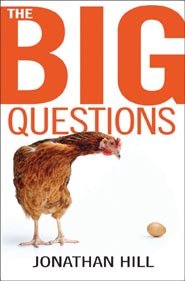A review of The Big Questions. By Jonathan Hill.
Lion, 2007. Available in Australia from Koorong Books.
This book combines two main areas: philosophy of religion, and historical theology. It examines the big questions that philosophers and theologians have wrestled with for millennia. These include, who is God?; is it reasonable to believe in God?; what about suffering and the problem of evil?; do faith and science conflict?; what about freedom and free will?; and what does it mean to be moral?
These are all huge questions which Christians have debated for centuries on end. And there has been a wide diversity of opinion on these sorts of issues. Hill makes it clear that there has not been unanimity amongst believers on any of these issues.
Given the scale and complexity of some of these questions, we should not be surprised to find so much discussion and at times disagreement on these issues. Consider the issue of science and religion. Are the two compatible? Are they mutually opposed? Are they able to peacefully coexist?
To answer these questions, Hill begins by noting the various ways Christians have interacted with secular philosophy. Some, like Tertullian, of course eschewed philosophy altogether, seeing it as incompatible with the Christian faith. Others, like Justin Martyr, embraced much of what the philosophers had to offer.


In similar fashion, there have been various ways in which science and faith have related to one another. Some see science as incompatible with religion. And some see religion to be above and beyond the constraints of science. But many believers see the two working together, albeit with some tension.
Hill reminds us that the clash between science and faith is often not as great as imagined. And he also reminds us that both sides quite often share similar traits. Christianity is – or should be – quite open to rational debate and hard questions. Faith need not be anti-rational.
And science has not always been the source of free-inquiry and openness to wherever the truth may lead. Often dogmatism and even faith commitments characterise the scientific endeavour, and it can be just as fundamentalist as any religion.
On the other big questions, Hill also examines how believers historically have approached such topics, and shows how there has often been a wide array of opinions on many of these contentious issues.
Indeed, the variety of opinions held by believers on these vexed questions is highlighted in this book. But if that is the strength of the book, it may also be its weakness. One might get the impression from reading this volume that there is hardly any Christian agreement at all on these tough questions.
While the pros and cons of the various perspectives and sides of the debates are given, little effort is made to show how some agreement might be reached. The reader is left with a large range of opinions, and no clear idea that any might be better than another, or that any possible unity on these issues might be found.
Indeed, Hill sets the stage right away in his introduction by noting how wide the diversity is on these issues, and that there does “not seem to be anything like ‘the’ Christian view on anything at all, even fairly fundamental things such as the nature of God”.
But one can respond with a yes and no here. Certainly the history of theology teaches us that there has indeed been a very wide range of views on almost every aspect of Christian thinking and practice. Yet there are also some basic essentials that have been hammered out in the early Christian creeds, such as the Apostle’s Creed and the Nicene Creed, which do indeed provide a fair amount of common ground and readily agreed-to core beliefs.
It is not as if every Christian is just left floating in theological space, with no clear framework by which to assess Christian teaching and doctrine. The line between orthodoxy and heresy may be wobbly at best, but a line nonetheless exists. Defining the parameters of theological orthodoxy may be a trying and difficult task, but it is a task we are nonetheless called to undertake.
Hill has written before on matters of Christian thought and historical theology. He is well versed in the main theological issues that have been debated over the centuries. The volume here nicely lays out the various answers given to some of these hard questions.
This book can be used for two purposes: as an apologetic tool for non-believers who are seeking some deep thinking on these tough questions. But its primary purpose seems to be to help believers understand the depth and nuance of the various questions, even if it may leave some believers frustrated with so many options and so little guidance as to which might be the better path to take.
However, if this volume gets believers to think more deeply and to further explore these important questions, then it will have done much good indeed.
[815 words]




















Sounds like an interesting book and your comments are probably to the point. The hard boundaries in theology are softening and even dissolving and that’s no bad thing; it’s time we recognized that more than one Christian biblical perspective is possible on questions such as predestination, for example. But there ought still to be boundaries between truth and error, which was the purpose of the ancient creeds.
Jon Newton